 Catherine Park
Catherine Park
PhD, Biokinesiology
Houston VA
Catherine Park, PhD, is a postdoctoral research fellow in the Innovation in Quality, Effectiveness and Safety (IQuESt) at Houston as part of the Big Data-Scientist Training Enhancement Program (BD-STEP). Catherine received her PhD at the University of Southern California. Her dissertation focused on designing, developing, and assessing the rehabilitation system for people after stroke. Her research interest is to assess and monitor patients' health conditions in various population and finding digital biomarkers through data mining to predict their clinical outcomes.
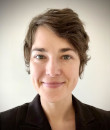 Micaela Scobie
Micaela Scobie
PhD, Biology
Durham VA
Micaela is a bench-turned-data scientist interested in precision medicine and using data to improve cancer patient health outcomes within the VHA. Prior to the BD-STEP fellowship Micaela was CSO for a small biotech company specializing in pneumococcal disease research and vaccine manufacture support. During this time, she learned valuable skills in project management, industry networking, and navigating regulatory hurdles. Micaela received her PhD in Biology with a focus on immunology and brain cancer from Clemson University. Her dissertation focused on immunomodulatory signaling of the aryl hydrocarbon receptor (AHR) in response to novel putative AHR ligands in Glioblastoma Multiforme, an aggressive brain cancer with no curative treatment. Micaela is excited to gain more experience in the data-driven clinical research sphere within the VHA system.
Now as a BD-STEP fellow in partnership with Duke University, Micaela plans to use electronic health records and genomic data from the National Precision Oncology Program’s database to answer medical practitioner-inspired, clinically relevant questions in the oncology sphere. With broad research interests, Micaela hopes to be involved in many projects. Her initial goal is to help determine whether high tumor mutational burden is an appropriate pan-cancer biomarker to indicate immune checkpoint blockade therapies such as recently FDA-approved pembrolizumab (anti-PD1) within the VA population. Overall, Micaela is excited to join a team dedicated to improving cancer patient health outcomes.
 Mayada Aljehani
Mayada Aljehani
DrPH, Epidemiology; MSPH, Biostatistics
Boston VA
Mayada Aljehani, DrPH, MSPH, is a Cancer Epidemiologist at the Lawrence J. Ellison Institute for Transformative Medicine of University of Southern California. Mayada received her MSPH in biostatistics and DrPH in epidemiology from Loma Linda University in California. She conducted her dissertation thesis within the California Cancer Registry (CCR), where she focused on the assessment of the impact of tumor and patients’ characteristics on colon cancer survival in the state of California. Using CCR database, she demonstrated differential impact of Bevacizumab and Cetuximab depending on whether the primary tumor location was in the left or the right colon.
In 2019, Mayada joined the BD-STEP fellowship at the Boston VA to work on the utilization of cancer case finding project. Her research focus on evolution of cancer treatment guidelines, health outcomes research, health economics, and quality of cancer care.
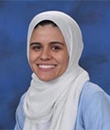 Hoda Magid
Hoda Magid
PhD, Epidemiology
Palo Alto VA
Hoda Abdel Magid, PhD, MHS, is a Post-Doctoral Fellow in the Division of Epidemiology in the Department of Health Research and Policy at Stanford University and the Palo Alto VA. Dr. Abdel Magid received her Doctorate in Epidemiology from the University of California, Berkeley in 2018 and her Masters of Health Science in Environmental Epidemiology from The Johns Hopkins Bloomberg School of Public Health in 2015. Dr. Abdel Magid is eager to acquire the skills, experience, and knowledge to become a leading independent health disparities investigator. Her graduate career research promoted the understanding of new and emerging tobacco products use among adolescents and young adults – a vulnerable population sub-group. Dr. Abdel Magid’s current and future research goals will build upon her previous training to further understand high risk chronic disease behaviors to gain insights pertaining to health disparities among safety net populations.
Tafheem Malik
PhD, Biochemistry
Houston VA
Tafheem Malik honored with a PhD in Biochemistry from the Karachi University, Pakistan in 2012, where Dr. Malik studied neuropharmacological regulation in neurotransmitters synthesis, metabolism and toxicity to identify pathways of the development of adverse effects on human models of Parkinson’s disease. Following exploring pathways, Dr. Malik used natural products to target the adverse effects of the neuroactive agents. Tafheem’ s dissertation largely focused on identifying the neuroprotective pathways at the treatment of neuroactive agents. Later, at Rush Medical Center, Dr. Malik analyzed a large data set of neuronal network connectivity to understand the pre-progression stages, and the progression of neurodegenerative disorders, includes Alzheimer’s disease, and later at the Northwestern University, Feinberg School of Medicine, on Parkinson’ s disease in prospective of understanding dementia progression in human.
As an adjunct faculty at the Roosevelt University, Tafheem taught Genetics Bases of Disease and Biology, later she joined as an Assistant Professor in the Department of Basic Sciences, National University of Health Sciences, IL., where Dr. Malik taught Physiology for three years and fused on studying neuropharmacological bases of neuroprotective mechanisms in the central nervous.
Additionally, Dr. Malik’s contribution admired as a Scientist advocate to the legislator at Washington D.C. and carried initiatives that supported design of effective public health policy where she represented the American Cancer Society, Michael J Fox Foundation of Parkinson’s Disease, and Society for Neuroscience Nationwide.
Dr. Malik currently is a Postdoctoral Research Fellow in the Michael E. DeBakey VA Medical Center, Baylor College of Medicine & Center for Innovation in Quality, Effectiveness and Safety (IQuESt) Houston VA HSR&D Center of Innovation, as part of the Big Data-Scientist Training Enhancement Program (BD-STEP). As a BD-STEP Advance, Allied Health Fellow, Tafheem’ s work with National Precision Oncology Program (NPOP), largely focusses on a large veteran cohort of colorectal cancer and using genetic variance at the cancer stages. Dr. Malik hopes to uncover unique pharmacological targets of the cancer treatment and their subtypes.
Tafheem’s focus on the mortality rate in HIV/AIDS patient of prostate cancer, additionally, discovering the relationship of Chronic Hepatitis C (CHC) to the Parkinson’s Disease using large data of HCV/ CHC surveillance, Direct Acting Antiviral treatment group and hoping to help to improve targets of the new interventions, understand association of neurological disease and contribute to reduce burden of cancer and neurological disorders.
 Hyunseok Kim
Hyunseok Kim
MD, MPH
Houston VA
Hyunseok Kim, MD, MPH is a gastroenterology and hepatology fellow at Baylor College of Medicine, supported by the NIH T32 grant. He is also a PhD candidate in genetic epidemiology at University of Texas School of Public Health and a fellow at the VA Big-Data Scientist Training Enhancement Program (BD-STEP). He graduated from medical school in South Korea (Yonsei University College of Medicine) in 2012 and did MPH in Epidemiology and Biostatistics at Johns Hopkins in 2013. After his MPH, he spent additional two years as an NCI-funded postdoctoral research fellow at Johns Hopkins before he moved to New Jersey to complete his internal medicine residency at Rutgers New Jersey Medical School.
His research interest is genetic epidemiology in liver cancer prevention. He is especially interested in genetic contribution to racial/ethnic disparity in liver disease, cirrhosis and liver cancer risk. His PhD thesis proposal is about admixture mapping of African American cirrhosis patients to identify African American specific genetic loci of cirrhosis-related complications including liver cancer. As a BD-STEP fellow, he would conduct the National Veterans Affair dataset to investigate racial/ethnic disparity in liver disease and how genetic information can be integrated into clinical practice. His ultimate career goal is to become an independent physician-scientist in the field of gastroenterology and hepatology by conducting epidemiological studies to accurately assess the burden of diseases and investigate genetic biomarkers to help ensure that each patient receives an appropriately personalized management.
Highlighted Past Fellows
 Linda Diem Tran
Linda Diem Tran
PhD, Health Policy and Management
Palo Alto VA
Linda (Diem) Tran has a BA in Economics, a Master of Public Policy degree, and PhD in Health Policy and Management. Her study on the social determinants of health provides a contextual framework for understanding health care delivery problems, and her training in health outcomes and translational science as a Clinical & Translational Science Institute (CTSI) pre-doctoral fellow has prepared her to conduct applied research in a health care delivery setting. Diem’s dissertation compared quantitative strategies for identifying gentrified neighborhoods and examined the impact of gentrification on adult mental health. Her research interests center on the underutilization of care, inequitable access to health care, and disparities in health care stemming from public policies and inefficiencies in delivery systems. Her interests specifically extend to disparities in cancer screening across social stratifications and health care delivery models.
 Jacqueline Ferguson
Jacqueline Ferguson
PhD, Environmental Health Sciences
Palo Alto VA
Jacqueline Ferguson is postdoctoral research fellow working with Dr. David Rehkopf at The Center for Population Health Sciences through the Big Data-Scientist Training Enhancement Program (BD-STEP) at the Palo Alto VA. She specializes in using secondary data sources such as occupational records, insurance claims, and electronic health records to study the relationship between environmental exposures and population health.
Her current research examines patterns of work and sleep disruption on human health, particularly among communities of color and US veterans. This research combines her interests and experience in utilizing secondary data sources to evaluate disproportionate impacts of occupational exposures on disadvantaged communities.
Jacqueline’s doctoral research examined the impact of specific components of shift work on worker health, and identified night and rotational work as risk factors for hypertension and Type II diabetes. Jacqueline received her doctoral degree in Environmental Health Sciences from the University of California, Berkeley and a Masters of Health Science in Environmental Health from the Johns Hopkins Bloomberg School of Public Health.
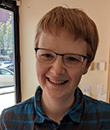 Linden Huhmann
Linden Huhmann
PhD, Environmental Engineering
Boston VA
Linden Huhmann has a PhD in Environmental Engineering from MIT and spent the year after graduation working at a startup that builds web applications for public health and natural hazards preparedness. They are passionate about applying data and building tools to support effective decision-making, and they recently designed and built the back end of a web application to provide emergency managers with information about a hospital's power status after a hurricane or other outage-triggering event. They have provided analysis in support of federal policy-making and contributed to legislation to protect Iowans from contaminated well water.
Linden's prior research has focused primarily on environmental contaminants with the potential to impact human health. As a PhD student at MIT, they studied the effects of naturally occurring arsenic in groundwater in Bangladesh on rice agriculture and worked to better quantify human exposure to arsenic in a Bangladeshi village. They have grown increasingly interested in health research and decision-making after collaborating with public health researchers during their PhD and contributing to web applications to aid in CDC decision-making during their year at a startup.
As a BD-STEP fellow, Linden will collaborate with Dr. Nikhil Munshi and Dr. Nate Fillmore to build a predictive model of progression to multiple myeloma, a cancer of the plasma cells, from monoclonal gammopathy of undetermined significance (MGUS), a precursor condition to myeloma. Outside of work, Linden is a Commissioner on the City of Cambridge LGBTQ+ Commission and enjoys many varieties of social dance.
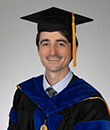 Cameron Miller
Cameron Miller
PhD, Biostatistics
Durham VA
Cameron Miller holds a PhD in Biostatistics from the Medical University of South Carolina. He enrolled at MUSC in 2012, where he began in the Biochemistry Department, studying the regulation of fatty acid synthesis in Pseudomonas aeruginosa in order to identify novel drug targets. However, the allure of data science was too strong, and after two years he restarted his doctoral program to seek a PhD in Biostatistics. Cameron’s dissertation focused on modeling imaging mass spectrometry data, which is marked by high dimensionality, high proportions of zeros, and inherent spatial autocorrelation.
As a BD-STEP fellow, Cameron is working with Elizabeth Hauser as part of the Cooperative Studies Program #380. This prospective study has followed a large veteran cohort under colonoscopy surveillance in order to identify risk factors associated with the development of colorectal cancer, as well as precancerous stages. Using polyp-level genetic information, Cameron hopes to uncover novel genetic associations with polyp subtypes.
 Kent Heberer
Kent Heberer
PhD, Biomedical Engineering
Palo Alto VA
Kent Heberer’s research background and work experience are in biomedical engineering, data science, and clinical research. He received his PhD in biomedical engineering from the University of California, Los Angeles in 2016, while doing research in the biomechanics of pathological gait for a clinical gait and motion analysis laboratory. His dissertation focused on the biomechanics of gait in boys with Duchenne muscular dystrophy, which has potential applications as outcome measures for clinical trials. He provided consulting services in the clinical testing and validation of a class II medical device, which ultimately received FDA approval. During his post-doctoral fellowship, he has received training in big data methods and has become familiar with doing research with electronic medical records.
His current research projects are in the fields of pharmacoepidemiology, endocrinology, and oncology. Specifically, he is focused on the generalizability and effectiveness of chemotherapeutics for the treatment of cancers (such as prostate cancer) in the Veterans Health Administration. This project aims to determine if the results published by clinical trials (such as overall or progression-free survival) are comparable to observational data in a more general population of the VHA. The results could then be used to inform clinical practice guidelines and improve the quality of healthcare. He is also involved in research projects that are investigating pharmaceuticals associated with patients with diabetes and at risk for developing diabetes. The analyses aim to use real-world electronic health and pharmacy data to assess the incidence of long-term adverse events (such as cancer) and potential associations with typically-prescribed pharmaceuticals for management of diabetes.
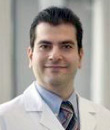 Javad Razjouyan
Javad Razjouyan
PhD, Biomedical Engineering
Houston VA
Dr. Javad Razjouyan got his MSc and PhD in Biomedical Engineering. He had post-doctoral research training from University of Arizona, college of medicine and Baylor college of medicine before joining the BD-STEP fellowship program. Javad has experience in image processing, signal processing, wearable sensors, machine learning and data mining. He worked in multiple clinically important projects such as fall risk in acute settings, physiological stress assessment, physical activity monitoring, big data mining in knee osteoarthritis, sleep assessment, determining frailty status by machine learning, etc., along with pure mathematic algorithm development like Lyapunov exponent estimation by fuzzy neural network and Poincare map development in recurrent plot analysis. His current project as a BD-STEP fellow is understanding the effect of cancer therapy on the mortality and readmission of patients with congestive heart failure admission. Furthermore, he is interested in the cardiotoxicity of different cancer therapies on cardiac compensatory reserve.
 Jon Lo Kim Lin
Jon Lo Kim Lin
PhD, Applied Mathematics
Boston VA
Dr. Jon Lo Kim Lin got his PhD in Applied Mathematics from UC Santa Barbara. He’s a card-carrying numerical analyst working on artificial intelligence for medical imaging at the VA. Specifically, he's looking for governing biological patterns that drive different phenotypes whose features are automatically quantified from CT scans. And more importantly, how those features are associated with clinical outcomes. When he's not debugging code, he spends time baking bread, and correcting people about the pronunciation of his first name; it's yun, sounds fun, right?
 Eva Clark
Eva Clark
MD, PhD, Microbiology
Houston VA
Eva Clark is currently an Infectious Disease Fellow at Baylor College of Medicine. She became interested in Tropical Medicine while working in the Philippines in 2004. Subsequently she was accepted as a MD/PhD candidate at the University of Alabama School of Medicine, and completed her PhD in microbiology in 2010; her PhD thesis project evaluated the natural humoral immune responses of several different Plasmodium falciparum vaccine candidate antigens in the Peruvian Amazon. In 2010 she was awarded a Fogarty Fellowship, which she spent setting up, coordinating, and implementing several research studies about Chagas disease in Southern Bolivia. Subsequently she completed a combined Internal Medicine and Pediatrics residency program at Baylor College of Medicine, and then continued on to do an Infectious Disease Fellowship at the same institution. She is currently in the research phase of her Infectious Disease Fellowship, and is interested in HIV related malignancies as well as parasite immunology and global health. She has entered the BD STEP program with the intention of using the Million Veterans Project genomic database to evaluate the immunologic response caused by HPV leading to head and neck cancer.
 Ted Feldman
Ted Feldman
PhD, Applied Physics
Boston VA
Ted earned his Ph.D. in Applied Physics from Harvard University in 2015. For his thesis research, he co-developed geometry sensitive, multiplexed single-molecule force-fluorescence assays and surface-free hydrodynamic single-molecule force spectroscopy tools. He then applied these to study the mechanobiology of actin filament severing. Additionally, he developed computational tools to rapidly identify true single-molecule tethers for multiplexed, sub-picoNewton, near-equilibrium force spectroscopy, a regime of force experiments previously only accessed by painstaking microfluidic devices with limited utility, and image analysis pipelines to detect and measure rare events in images with high background actin signals.
As the Curriculum Fellow for Developmental and Regenerative Biology at Harvard Medical School (HMS), Ted developed curricula to support rigor and reproducibility training tailored for emerging research technologies that rely upon high-dimensional data and to support quantitative skills training, in coding and statistics for training graduate students in the biomedical sciences. Ted co-directs Computing Skills for Biomedical Sciences within the Department of Biomedical Informatics at HMS with Professors Nils Gehlenborg and Peter Kharchenko.
Opportunities to study translational medicine from the classroom to the beside guided him to pursue research in clinical bioinformatics. Ted’s research uses electronic health data to provide insights into the association of acute viral hepatitis and liver cancer, epidemiology, treatment and to develop in-silico diagnostics for health surveillance and diagnosis.
 Sheldon Tetewsky
Sheldon Tetewsky
PhD, Cognitive Psychology
Buffalo VA
Dr. Sheldon Tetewsky got his PhD in Cognitive Psychology from Yale University and several years later received a masters in Information Technology from RIT. He has previously done research in the areas of learning and individual differences, visuo-spatial disorientation in Alzheimer's patients, and community health. As a BD-STEP fellow he is examining how the LOINC document ontology can be used to facility NLP analysis of report notes, and he is also involved in evaluating the effectiveness of direct oral anticoagulents in preventing strokes in cancer patients. In his free time he is an amateur musician and he also likes to read novels and historical fiction. You can reach him at s_tetewsky@yahoo.com.
 Wilmon McCray
Wilmon McCray
PhD, Systems Science
Buffalo VA
Dr. Wil McCray received his PhD in Systems Science with an emphasis in Software and Systems Engineering from the Thomas J. Watson School of Engineering and Applied Science, Binghamton University and a Master’s in Engineering Management from the State University of New York at Buffalo. Dr. McCray is a second year postdoctoral BD-STEP Fellow at the Western New York VA Healthcare System.
Dr. McCray conducts cardiology and oncology research using a data-driven approach. Dr. McCray’s research studies and operational projects are as follows: The Natural Language Processing (NLP) Approach to Lung Cancer Stage and Grade Using Electronic Health Record (EHR) Data, The Use of a Data-Driven Approach to Address Healthcare Disparities, and supporting an operational project in Precision Oncology. During his first year of the BD-STEP Fellowship, Dr. McCray developed a body of knowledge in the VA Oncology Management System.
Dr. McCray is also a professional photographer and videographer; he uses his media skills to create video documentaries. In his leisure time, he enjoys conducting historical research, genealogy research, and oral video interviews to document history.
 Andrew Chang
Andrew Chang
PhD, Biochemistry
Palo Alto VA
Andrew Chang is a researcher interested in both health science and data science. His current research investigates the correlation between diabetes and cancer utilizing electronic health records and genomic data. His long-term goal is to use innovative techniques in data science such as machine learning to further improve population health through early disease detection and prediction.
Before he joined BD-STEP, Chang was a structural biologist proficient in RNA structures and molecular dynamic simulation and He acquired his PhD in Biochemistry at Rice University. He also holds a MS/MPH dual-degree in Health Informatics from UTHealth and a BS degree in Clinical Laboratory Science from National Taiwan University. He is jointly appointed at VA Palo Alto and Stanford University as part of Dr. Jennifer Lee’s group.
 Rafael Fricks
Rafael Fricks
PhD, Biomedical Engineering
Durham VA
A native of Curitiba, Brazil, Rafael Fricks grew up between Curitiba, Durham, NC, and Keller, TX. In his doctoral studies at Duke University, he primarily researched applications of stochastic models and machine learning in health care, with a focus on model validation and clinic performance optimization. His publication modeling chronic kidney disease progression received the 2016 Thomas L. Fagan Award for best student paper by IEEE Reliability and Maintainability Symposium. From 2015 to 2017 he applied research concepts in modeling diagnostic imaging device dependability at Siemens Healthineers. Since 2015 he has modeled clinic flow at Duke Eye Centers, a multi-specialty outpatient facility seeing as many as 350 patients per day, culminating in dissertation work in end-to-end clinic modeling for performance evaluation and optimization. He received his Master of Science (MS) degree in Biomedical Engineering in 2017 and will defend his Doctorate in Biomedical Engineering in October 2018 from Duke University, co-advised by Roger Barr and Kishor Trivedi.
In 2018 Rafael joined the BD-STEP Program to develop predictive modeling methods for detecting earlier signs of lung cancer progression under Dr. Ehsan Samei and Dr. Michael Kelley. VA patient records contain many features, from patient history, to lab values, to previous imaging studies. Unforeseen combinations of these patient variables with radiomics markers derived from imaging studies may improve therapeutic response prediction for lung carcinomas. Merging expertise in advanced imaging and machine learning with available medical expertise in this manner may lead to improved clinical decision support tools. These tools are projected to reduce the burden of testing on patients, allow practitioners to see more patients, and perhaps lead to earlier detection. As a member of the VA, Rafael will hone modeling skills to continue professional research in image analysis and medical informatics, with the intent of contributing to impactful developments in how medical practice will evolve with the availability of advances in engineering methods and artificial intelligence.
 David Winski
David Winski
PhD, Computational Biology and Bioinformatics
Durham VA
David Winski holds a PhD in Computational Biology and Bioinformatics from Duke University. For his dissertation he studied the dynamics of gene expression during cell growth and division. He received a Bachelor of Arts degree from Macalester College in St. Paul, Minnesota, and studied neuroscience and computer science as a post-baccalaureate at the University of Illinois-Chicago. He has worked as a teacher’s aide, hospital tech, research assistant and teaching assistant. His professional interests include the application of machine learning to cancer and aging research.
During his BD-STEP Fellowship at the Durham VA he will work with guidance from Drs. Michael Kelley and Warren Kibbe to perform a retrospective survival analysis on a cohort of cancer patients treated with immunotherapy through the VHA health system. For this analysis, methods from natural language processing will be used to extract tumor biomarker features from clinician text notes. These features will then be combined with patient demographic and, when available, sequence data in a survival model.
 Kyle Lafata
Kyle Lafata
PhD, Physics
Durham VA
Kyle Lafata is currently a postdoctoral associate and physicist at Duke University working on medical imaging, applied mathematics, and data science. His primary research interests are in the applied analysis of differential equations, stochastic models, and data-driven techniques to biomarker discovery, image reconstruction, and predictive analytics in cancer medicine.
Kyle received his PhD in Medical Physics from Duke University in 2018 for his research in the emerging field of Radiomics. Radiomics attempts to identify computational biomarkers hidden within high-throughput medical imaging data, and may be able to noninvasively detect the underlying phenotype of certain tumors. As a BD-STEP Fellow at the Durham VA, Kyle is working to develop robust radiomic signatures that capture and encode disease response to radiation therapy. If translated into clinical practice, these image-based biomarkers would allow clinicians to identify cancer recurrences sooner, leading towards individualized modification of therapy.
 Steven Cogill
Steven Cogill
PhD, Genetics
Palo Alto VA
Dr. Steven Cogill got his PhD in Genetics with a bioinformatics focus from Clemson University in 2016. He also has a master’s degree in biochemistry from Indiana University. He has successfully transitioned from bench to computational science. His research interest is in improving patient outcomes through the application of data mining with machine learning both at the macro and molecular level. Currently, he is working on predicting rare diagnostic events through patient history analysis, broad and personalized epigenomic responses to inflammatory stimuli, rapid bacterial identification assay, and improving machine learning approaches with small high dimensional datasets. He currently holds a dual appointment at the VA and Stanford.

